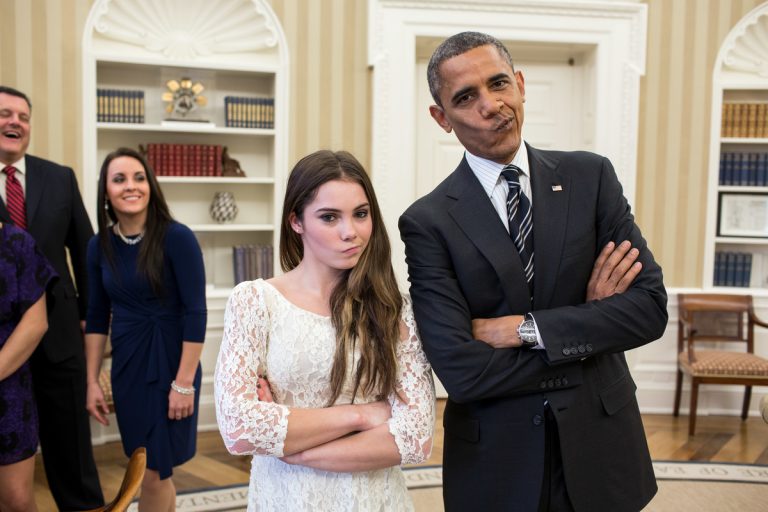
U.S. President Barack Obama jokingly mimics U.S. Olympic gymnast McKayla Maroney's "not impressed" expression while greeting members of the 2012 U.S. Olympic gymnastics teams in the Oval Office November 15, 2012 at the White House in Washington, DC. Image by Pete Souza/The White House, © All Rights Reserved.
Presuming a Reservoir of Goodness
“Presuming a reservoir of goodness in others can be a risk.”
So said our outgoing president, Barack Hussein Obama, in his final speech in Chicago this week. I watched while thinking about all that I have so often taken for granted these past eight years — a man, however imperfect, who quotes historian Doris Kearns Goodwin and hip hop artist Talib Kweli. A man who has grown gray from knowing just how impossible and necessary his job has been. A first lady who so lovingly makes fun of that man, while also clearly talking about him with such respect. A brilliant, grounded woman who, against all odds, really does seem to have managed to be so much of herself while under a racially-tinted microscope. A family that remade The White House, not just in symbol, but in substance, too. America will never be the same.
Presuming a reservoir of goodness in others can be a risk. My president is right about that. It’s one I managed to take with him. After I first saw him speak at the Democratic National Convention in 2004, just 24 years old myself, I went home and made a DIY Obama shirt with iron on letters. It was crooked and a little odd, but it represented something important — that he had awakened an optimism about politics in me that I’d never felt before. On July 27, 2004, a personal relationship between me and the presidency was born.
So as this man leaves office, it’s strange to be feeling so estranged from the optimism that he woke in me. He was formational in making me feel like the highest offices in this land could, though they rarely do, reflect something genuine, something ethically nuanced, something fresh and forward-looking. As he walks away, I feel more convinced than ever that what motivates people to run for office is too often not a “reservoir of goodness,” but instead a deep, unquenchable thirst for recognition. Not because of him, but because of what surrounds him, because of what his rise seems to have surfaced in people.
I sit with the sadness of that. I wonder if that’s the inevitable souring of age. I’m 37 now. I’ve been places, done things, had my heart broken, seen the sausage made, been disappointed, surely disappointed others. So many times. I’ve become intimate with the push and pull of wanting to be an ethical human and also succumbing to the inevitabilities of compromise, of patience, of impurity. I no longer make DIY shirts. I mostly make sunbutter sandwiches and think about how my daughters are inheriting a country unworthy of them.
But I also wonder if what’s an even bigger risk than “presuming a reservoir of goodness in others” is presuming a reservoir of malevolence. Because that’s where I’m at. A good friend texted me the other day: “Who is Trump’s mother?” And it struck me as one of the most important questions anyone has asked in the aftermath of his election.
I can’t presume pure evil if I understand someone’s story, and everyone’s story, in one way or another, begins with a mother. We start out so terrifically vulnerable. Even the most seemingly invulnerable of us.
I googled, as one does these days, and I learned that Trump’s mother was a Scottish immigrant, the youngest of ten. English was not her first language. She was a domestic worker for a time when she came to America at 18. I learned that on Halloween of 1991, at nearly 80 years old, Mary Anne MacLeod Trump was mugged and severely beaten, suffering permanent damage to her sight and hearing. I can only imagine that seeing his mother in the hospital, bruised and in shock, must have been incredibly painful for her son.
Who is Mary Anne’s son, really? What reservoir is he made of? What risks has he taken? (I’m not talking about financial risks, but risks of the human spirit.) What made him so incurious, so blustery, so defensive? What is he so afraid of? Who can make him laugh at himself? What does he really love? Who does he really love?
At 24, I fell in love with a political figure. At 37, I’m straining not to hate one. I recognize that in both cases, there is the danger of blindness.
It’s not so important that I truly see Trump (does he even see himself?) as much as the nearly 62 million people who voted for him. Presuming their malevolence is a risk I’m unwilling to take. It would mean that we really are made of different stuff, which seems not only intolerant, but dumb. We all start from that terrific vulnerability. We all have mothers, whether they stick around or not. We all want love, meaning, safety, and sandwiches. We all tolerate a tremendous amount of risk, which is to say we keep waking up every morning and trying to be people in the world, which is inherently risky. I’ll start there.
